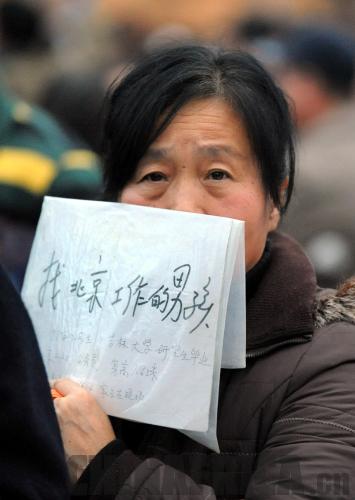|
 |
|
(YANG XINYUE) |
One of the most interesting aspects of Chinese social life for a foreigner living in China is watching the urgency with which parents search for suitable partners for their unmarried sons and daughters.
Apparently fed up with their offspring, many of whom are in their 30s, still single, proactive parents have taken matters into their own hands and literally gone spouse hunting.
The system it seems is pretty straight forward. Parents pitch up at a designated location, armed with details of their children and network until they find parents with a prospective partner of opposite sex, similar age, background, height, weight and financial status.
When all criteria match, the contact details of the children are swapped. Names are not given for security reasons.
Subtlety is not always part of the plan to marry off one's dearest and nearest. Some parents become so desperate to get their offspring down the aisle they throw caution to the wind and write the names and details of their child on boards that they hang around their necks. This is serious matchmaking and what started as a handful of fraught parents has swelled into a group of more than a thousand in just one of Beijing's many public parks. But the problem, it would appear, is not an isolated one.
A survey conducted by the All-China Women's Federation in 2011 said unmarried Chinese men and women above the legal age for marriage, 22 for men and 20 for women, numbered 180 million. The increase in the number of singles is more visible in large cities where numbers in Beijing and Shanghai are estimated to be on the north side of 1 million.
Parents on the hunt, often quote an old saying: "How do you split firewood? Without an ax it can't be done. How do you go about finding a wife? Without a go-between it can't be done."
It's clear these parents are desperate and out of options. Some also admitted they were there without their children's knowledge. But what if the child was called by an unknown suitor and became curious about how their details were acquired? No problem, as parents admitted they would lie and make up a story about the caller being the relative of a colleague.
Reasons given for the "crises" in the single stakes is that most of these unmarrieds are too busy with career development to find time to meet a suitable spouse, and when they do have time to look, their standards are set way too high.
Yet, despite the zeal of parents in setting up the children for life, the organizer of the group in a Beijing park admitted that only one pair in a hundred supposed matchings eventually tie the knot. Not a good strike rate by anyone's standards. More hit and miss, than Mr. and Miss.
This system seems a much loser version of arranged marriages, found in countries like India for example. But the underlying tone here seems disturbing. What comes across is the deep-seated desire of parents feeling responsible for the single status of their children beyond a certain age. It isn't that children have abrogated their responsibility toward marriage. It's almost like the process of upbringing must include birth, a healthy upbringing, education and completion of marriage rituals. In the eyes of these parents, no doubt, single children beyond a certain age is a sign of the parents' failure, something unconscionable for them. And then there is always the Chinese social stigma of losing face.
Yet in tandem with social development, arranged marriages in China are not accepted on a wide scale by most young Chinese, who see it as something old fashioned and stuck in another time dimension.
People are marrying and having children later in life. It's a part of a global trend. Up-tempo lifestyles and material wealth translates into more choices and a large part of those choices are about individuality. Many Chinese social groups are saturated with 30 and 40-year-olds, single, childless and never married. They have crossed their own connubial rubicon and are showing no signs of reverting to tradition. In the West increasing numbers of singles cohabit, a lifestyle that is slowly gaining favor with China's urban youth.
Love and care are becoming more important bonds in marriage than security and children.
Perhaps it is here that the parents so anxious to wed their children miss the boat. Generally older members of society have little experience in self-reliance, or at being financially self-supporting and become concerned that a single life will be detrimental to their children.
Two generations and two mindsets are meeting face to face in this most interesting slice of Chinese life. |